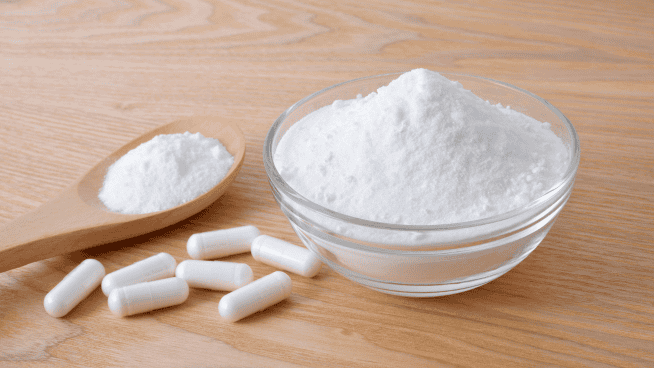How Taurine Can Help Improve Athletic Performance and Recovery
Taurine is a naturally occurring amino acid. It has gained attention in the athletic and fitness world for its potential to boost performance and accelerate recovery. While often overshadowed by the fanciness of other supplements, taurine plays a critical role in various physiological processes that can benefit athletes at all levels.
What is Taurine?
Taurine is abundant in the human body, particularly in the muscles, heart, brain, and eyes. Unlike other amino acids, taurine is not used to build proteins. Instead, it serves various functions, including regulating calcium levels in cells, bile salt formation, antioxidation, and the balance of fluids and electrolytes in the body.
Taurine is also found in many foods, particularly meat, dairy products, and fish. It is a common ingredient in energy drinks.
Taurine and Athletic Performance
1. Improved Endurance
Taurine has been shown to enhance endurance by improving muscle function and reducing fatigue. One fundamental way taurine achieves this is by helping to maintain proper electrolyte balance within muscle cells. This balance is crucial during prolonged physical activity, preventing muscle cramps and sustaining energy levels.
Additionally, taurine’s antioxidant properties help mitigate the oxidative stress that builds up during intense exercise. By reducing oxidative damage, taurine allows muscles to perform more efficiently and for longer periods
2. Enhanced Muscle Contraction
Taurine plays a significant role in muscle contraction, particularly by regulating calcium flow within muscle cells. Calcium ions are essential for muscle fibers to contract and produce force. Ensuring calcium levels are correctly managed, taurine helps optimize muscle contraction, improving strength and power during workouts.
This effect is particularly beneficial in high-intensity, short-duration exercises such as sprinting, weightlifting, and other anaerobic activities where muscle power is crucial.
3. Support for Aerobic Performance
Taurine has also been linked to improved aerobic performance. Studies suggest that taurine supplementation can increase the efficiency of oxygen transport and utilization within the body. This is important in endurance sports like running, cycling, and swimming, where the ability to sustain aerobic activity is critical to performance.
Taurine and Recovery
1. Reduced Muscle Soreness
Post-exercise or delayed onset muscle soreness (DOMS) can be a significant barrier to consistent training. Taurine has been shown to reduce the severity of DOMS by decreasing muscle inflammation and oxidative stress. This allows athletes to recover faster and return to training sooner, maintaining the consistency needed for optimal progress.
2. Enhanced Muscle Repair
Taurine’s role in cellular protection and repair extends to its ability to enhance muscle recovery. After intense exercise, muscle fibers undergo microscopic damage, which needs to be repaired for muscle growth and adaptation. Taurine aids in this repair process by stabilizing cell membranes and reducing the extent of cellular damage, leading to faster recovery times.
3. Improved Hydration
Hydration is essential for performance and recovery, as it helps remove metabolic waste products and deliver nutrients to muscle tissues. Taurine’s role in electrolyte regulation helps maintain fluid balance in the body so muscles remain hydrated and capable of efficient recovery.
How to Use Taurine for Performance and Recovery
It is important to note that while taurine is generally safe and well-tolerated. However, it is always advisable to consult your healthcare provider. Taking any new supplement can have adverse effects, especially for those with underlying health conditions.
Taurine Dosage and Best Time to Take It
Recommended Dosage: The optimal dosage of taurine typically ranges from 500 mg to 2,000 mg per day. 1,000 mg daily is often sufficient for most individuals to experience the performance and recovery benefits. In comparison, athletes or those engaging in intense physical training might opt for a higher dose closer to the upper range of 2,000 mg.
Best Time to Take Taurine
- Pre-Workout (30-60 Minutes Before Exercise): Taking taurine before your workout can enhance muscle contraction, reduce fatigue, and boost endurance. This timing allows taurine to be readily available in your muscles during exercise, helping to optimize performance.
- Post-Workout: Taurine taken after exercise can support recovery by reducing muscle soreness, inflammation, and oxidative stress. Post-workout supplementation helps replenish taurine levels, aiding in faster muscle repair and recovery.
- Split Dosing: For those looking to maximize taurine’s benefits during performance and recovery, splitting the daily dosage into two—half taken before exercise and half after—can be an effective strategy.
General Tip: Taurine can be taken with or without food, as it does not strongly impact digestion. Pairing it with your usual pre- or post-workout nutrition routine makes it easy to remember and ensures optimal absorption.
Always consult a healthcare provider before starting taurine supplementation, especially if you have any existing health conditions or are taking other medications.
Foods with Taurine
While your body can produce some taurine, incorporating foods can enhance the levels.
- Seafood:
- Shellfish: Scallops, clams, and mussels boast some of the highest taurine levels.
- Dark meat/fish: Tuna and tilapia are good sources.
- Meat and Poultry:
- Organ meats: Liver and heart are particularly rich in taurine.
- Dark meat poultry: Chicken thighs and turkey contain more taurine than breast meat.
- Dairy: Milk, yogurt, and cheese offer moderate amounts of taurine.
- Eggs: A decent source of taurine, especially the yolks.
- Seaweed: Nori, a type of seaweed used in sushi, is a good option for those on plant-based diets.
- Energy Drinks: While they do contain taurine, their high sugar and caffeine content make them an unhealthy choice
Taurine is a versatile amino acid that offers numerous benefits for athletes, from enhancing endurance and muscle contraction to speeding up recovery and reducing muscle soreness. Incorporating taurine into your supplementation routine can elevate your athletic performance and ensure faster recovery, enabling you to train harder and more consistently.
Check out my book Eat to Win for weeks of nutritional plans for breakfast, lunch and dinner. And Blended Bliss if you love smoothies!
Check out my INSTANT STRENGTH book for total strength, speed, and power programs.
To maximize stability, mobility, and flexibility, check out my book, THE BALANCED BODY.
To see great exercises, methods, and techniques videos, subscribe to my YouTube channel, BALANCED BODY.
RECOMMENDED FOR YOU
MOST POPULAR
How Taurine Can Help Improve Athletic Performance and Recovery
Taurine is a naturally occurring amino acid. It has gained attention in the athletic and fitness world for its potential to boost performance and accelerate recovery. While often overshadowed by the fanciness of other supplements, taurine plays a critical role in various physiological processes that can benefit athletes at all levels.
What is Taurine?
Taurine is abundant in the human body, particularly in the muscles, heart, brain, and eyes. Unlike other amino acids, taurine is not used to build proteins. Instead, it serves various functions, including regulating calcium levels in cells, bile salt formation, antioxidation, and the balance of fluids and electrolytes in the body.
Taurine is also found in many foods, particularly meat, dairy products, and fish. It is a common ingredient in energy drinks.
Taurine and Athletic Performance
1. Improved Endurance
Taurine has been shown to enhance endurance by improving muscle function and reducing fatigue. One fundamental way taurine achieves this is by helping to maintain proper electrolyte balance within muscle cells. This balance is crucial during prolonged physical activity, preventing muscle cramps and sustaining energy levels.
Additionally, taurine’s antioxidant properties help mitigate the oxidative stress that builds up during intense exercise. By reducing oxidative damage, taurine allows muscles to perform more efficiently and for longer periods
2. Enhanced Muscle Contraction
Taurine plays a significant role in muscle contraction, particularly by regulating calcium flow within muscle cells. Calcium ions are essential for muscle fibers to contract and produce force. Ensuring calcium levels are correctly managed, taurine helps optimize muscle contraction, improving strength and power during workouts.
This effect is particularly beneficial in high-intensity, short-duration exercises such as sprinting, weightlifting, and other anaerobic activities where muscle power is crucial.
3. Support for Aerobic Performance
Taurine has also been linked to improved aerobic performance. Studies suggest that taurine supplementation can increase the efficiency of oxygen transport and utilization within the body. This is important in endurance sports like running, cycling, and swimming, where the ability to sustain aerobic activity is critical to performance.
Taurine and Recovery
1. Reduced Muscle Soreness
Post-exercise or delayed onset muscle soreness (DOMS) can be a significant barrier to consistent training. Taurine has been shown to reduce the severity of DOMS by decreasing muscle inflammation and oxidative stress. This allows athletes to recover faster and return to training sooner, maintaining the consistency needed for optimal progress.
2. Enhanced Muscle Repair
Taurine’s role in cellular protection and repair extends to its ability to enhance muscle recovery. After intense exercise, muscle fibers undergo microscopic damage, which needs to be repaired for muscle growth and adaptation. Taurine aids in this repair process by stabilizing cell membranes and reducing the extent of cellular damage, leading to faster recovery times.
3. Improved Hydration
Hydration is essential for performance and recovery, as it helps remove metabolic waste products and deliver nutrients to muscle tissues. Taurine’s role in electrolyte regulation helps maintain fluid balance in the body so muscles remain hydrated and capable of efficient recovery.
How to Use Taurine for Performance and Recovery
It is important to note that while taurine is generally safe and well-tolerated. However, it is always advisable to consult your healthcare provider. Taking any new supplement can have adverse effects, especially for those with underlying health conditions.
Taurine Dosage and Best Time to Take It
Recommended Dosage: The optimal dosage of taurine typically ranges from 500 mg to 2,000 mg per day. 1,000 mg daily is often sufficient for most individuals to experience the performance and recovery benefits. In comparison, athletes or those engaging in intense physical training might opt for a higher dose closer to the upper range of 2,000 mg.
Best Time to Take Taurine
- Pre-Workout (30-60 Minutes Before Exercise): Taking taurine before your workout can enhance muscle contraction, reduce fatigue, and boost endurance. This timing allows taurine to be readily available in your muscles during exercise, helping to optimize performance.
- Post-Workout: Taurine taken after exercise can support recovery by reducing muscle soreness, inflammation, and oxidative stress. Post-workout supplementation helps replenish taurine levels, aiding in faster muscle repair and recovery.
- Split Dosing: For those looking to maximize taurine’s benefits during performance and recovery, splitting the daily dosage into two—half taken before exercise and half after—can be an effective strategy.
General Tip: Taurine can be taken with or without food, as it does not strongly impact digestion. Pairing it with your usual pre- or post-workout nutrition routine makes it easy to remember and ensures optimal absorption.
Always consult a healthcare provider before starting taurine supplementation, especially if you have any existing health conditions or are taking other medications.
Foods with Taurine
While your body can produce some taurine, incorporating foods can enhance the levels.
- Seafood:
- Shellfish: Scallops, clams, and mussels boast some of the highest taurine levels.
- Dark meat/fish: Tuna and tilapia are good sources.
- Meat and Poultry:
- Organ meats: Liver and heart are particularly rich in taurine.
- Dark meat poultry: Chicken thighs and turkey contain more taurine than breast meat.
- Dairy: Milk, yogurt, and cheese offer moderate amounts of taurine.
- Eggs: A decent source of taurine, especially the yolks.
- Seaweed: Nori, a type of seaweed used in sushi, is a good option for those on plant-based diets.
- Energy Drinks: While they do contain taurine, their high sugar and caffeine content make them an unhealthy choice
Taurine is a versatile amino acid that offers numerous benefits for athletes, from enhancing endurance and muscle contraction to speeding up recovery and reducing muscle soreness. Incorporating taurine into your supplementation routine can elevate your athletic performance and ensure faster recovery, enabling you to train harder and more consistently.
Check out my book Eat to Win for weeks of nutritional plans for breakfast, lunch and dinner. And Blended Bliss if you love smoothies!
Check out my INSTANT STRENGTH book for total strength, speed, and power programs.
To maximize stability, mobility, and flexibility, check out my book, THE BALANCED BODY.
To see great exercises, methods, and techniques videos, subscribe to my YouTube channel, BALANCED BODY.










